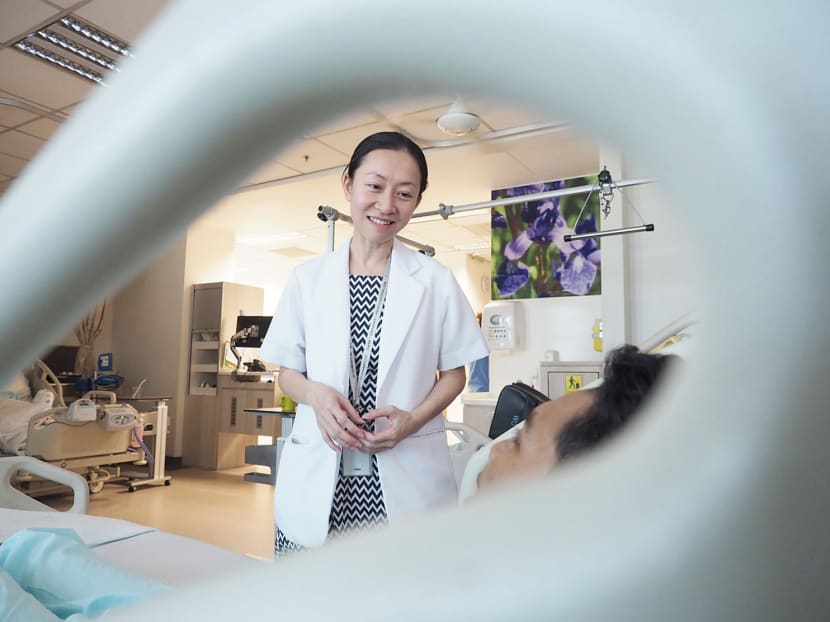Helping to heal the mind after major physical trauma
Singapore —When Mrs Mary Ann Rodriguez was hospitalised after sustaining serious injuries in a road accident in January last year, doctors did more than just mend her physical health; they also paid special attention to her mental well-being.
Singapore —When Mrs Mary Ann Rodriguez was hospitalised after sustaining serious injuries in a road accident in January last year, doctors did more than just mend her physical health; they also paid special attention to her mental well-being.
The 64-year-old secretary was screened for signs of psychological distress shortly after she was admitted to Tan Tock Seng Hospital (TTSH), and seen by a trauma psychologist who helped her cope with the shock and grief of losing her husband, who was riding a motorcycle at the time of the accident.
Mrs Rodriguez, who was riding pillion on the motorcycle, suffered facial and leg injuries as well as fractures to her pelvis and ribs.
“When someone you love just passes on like that, your life changes completely. I’m very grateful the doctors arranged for a psychologist to see me during my hospital stay. Until today, the same psychologist has been guiding me through this difficult period, one step at a time,” said Mrs Rodriguez.
Trauma is currently the leading diagnosis for hospital admissions in Singapore.
Over the past decade, TTSH has seen an increasing number of serious trauma cases, most of which are due to falls and motor vehicle accidents. Last year, the hospital saw 1,633 serious trauma cases that required hospital admission — nearly double the 833 patients in 2005.
In addition to physical injuries, traumatic events can also lead to psychological distress, which may persist long after the body heals.
This has spurred some hospitals here to provide early psychological support and intervention to trauma patients.
TTSH’s Trauma Service routinely screens trauma patients for signs of stress even before they start exhibiting any symptoms.
The screening is usually done 24 hours after admission using a simple questionnaire and interview by a team, which also observes the behavioural patterns of patients during their hospital stay.
Approximately six in 10 trauma patients admitted to TTSH and those on follow-up visits with its trauma clinic are screened for psychological issues, said Dr Teo Li Tserng, chief of trauma and acute care surgery at TTSH’s department of general surgery.
Those who skip the routine screening usually have medical reasons or severe injuries that prevent them from being assessed, added Dr Teo, who spoke at the annual Singapore Trauma Conference 2016 organised by the hospital last month.
At the Singapore General Hospital (SGH), patients who sustain traumatic injuries as a result of incidents such as road traffic accidents and falls from height are routinely referred to its medical social workers, who also provide grief and bereavement support when a death has occurred.
Patients whose acute stress symptoms persist are referred to the hospital’s psychiatrists, said Ms Esther Lim, head of medical social services at SGH.
The National University Hospital (NUH) is currently developing a trauma screening programme and expects to launch it in the second half of this year.
Senior psychologist Ivena Clarissa of NUH’s department of psychological medicine said patients under the care of NUH’s trauma team will be screened once they are out of intensive care and referred to a psychiatrist, psychologist, or psycho-education group so that they can pick up relevant coping skills and resources.
CATCHING PSYCHOLOGICAL ISSUES EARLY
TTSH’s screening programme aims to prevent and catch any early psychological issues before they become “too complicated” in the long run, said its senior psychologist, Ms Lanurse Chen, who has been offering Mrs Rodriguez psychological support since she was admitted to TTSH with serious injuries.
According to Ms Chen, as many as seven in 10 patients will experience some form of acute stress reaction in the aftermath of a traumatic incident.
NUH’s Ms Clarissa said it is not uncommon for trauma victims to display anxiety and depression, or behavioural symptoms such as anger or aggression, as they adjust to post-trauma life.
This initial reaction is “normal” and for most people, the symptoms usually subside over time, said Ms Chen.
“However, when these psychological issues are not addressed early, they may develop into something more severe, like post-traumatic stress disorder and depression in the longer term. This is particularly so for those who are hospitalised, who may experience other stressors such as concerns about hospital bill, pain from their injuries, and uncertainty, which can all build up,” she added.
Without intervention and support, these debilitating psychological symptoms can interfere with trauma victims’ everyday life.
“We have seen cases whereby patients were not able to return to work due to the association of work with their injuries,” said Dr Teo.
One recent case he encountered was a woman in her late 20s who was hit by a car while crossing the road on her way to work. Even after her physical injuries healed, fear and flashbacks of the traumatic event prevented her from returning to work for three weeks, said Dr Teo. Her condition gradually improved with the help of psychotherapy and her partner’s support.
More than a year after the tragic accident, Mrs Rodriguez’s physical health is on the mend, but the psychological effects of her husband’s death and stress from current financial issues linger.
However, she is comforted by her monthly follow-ups with her psychologist. While support from family and friends is important, Mrs Rodriguez believes it is crucial for trauma victims to seek professional counselling.
“Many friends have told me to forget and move on. They mean well but sometimes, their advice is not right because it is not easy for a person who has gone through trauma to simply ‘move on’. I’m just glad my psychologist understands what I’m going through and is helping me to cope,” she said.







